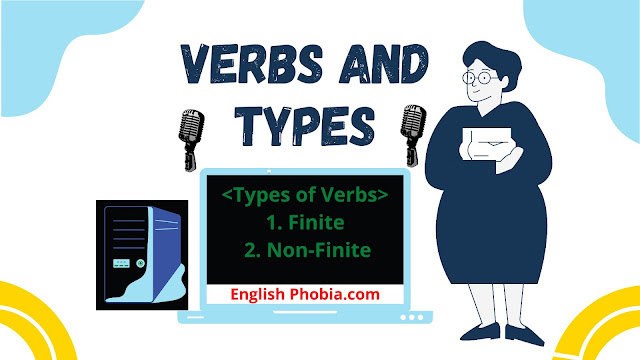What
is a verb definition?
1.
A verb is a word that is
used to show any action or activity that happens for a purpose.
The
teachers teach the students in
school.
We
go to school to study.
The
employees make the owner rich.
The
above written sentences are some examples of the verbs. I have underlined them
so that these can be vividly identified at once easily.
2.
There is a simple Verb Definition for kids that the verbs
are the words which are known as doing words or action words.
Examples
Run, come, dance, Study, type, understand,
etc. are some examples of verbs.
3.
A verb is a word which we
use to show anger, mood, choice, likes, dislikes, urgency, responsibility, duty
or any other activity.
Hurt, harm, romance, dance, dine, like,
choose, hate, disapprove, refuse, work, earn, fulfill, run, walk, or learn.
The
above mentioned lines show Verb
definition and examples for you to learn it at ease.
Verbs
and types
The
actions verbs are mainly divided into two parts just as shown in the below
table.
Types of Verbs
|
||
|
1.
Finite |
2.
Non Finite |
|
In
this post you are going to learn the first type of verbs which is Finite verbs.
This verb is the most important verb. This type of verbs are mainly used in the
sentences we use for our daily conversation.
Finite Verbs
|
||||
Auxiliary Verbs
|
|
Main Verbs
|
||
|
1 |
Primary Auxiliary |
1 |
Transitive Verbs |
|
|
2 |
2 |
Intransitive Verbs |
||
|
3 |
Semi Model Auxiliary |
3 |
Causative Verbs |
|
You
may have heard your teacher saying action verbs and helping verbs. You should
not worry about these things because if you missed them in the class, you will
have these things at your finger’s tips when you have gone through this post
with concentration.
Auxiliary Verbs : This
auxiliary word can seem strange to you but this is not in reality. According to
the grammar the helping verbs are called auxiliary verbs hence it is clear to
you hopefully about the auxiliary verbs.
Now
let’s start with the auxiliary verbs which are very crucial to in English
language.
1.
Primary
Auxiliaries: There are some verbs in the English
language which we use as an action verb as well as an auxiliary verb too these
types of verbs are called primary auxiliary verbs.
Have
: has, have, had, having
Do :- do, does, did,
Be
:- is, am, are, was, were, shall
be, will be, being, been
These
are the primary auxiliary verbs in English. You can use them as both an action
verb and a helping verb.
Let’s
see some examples for a better explication in this regard.
Have
As a helping verb
1. I
have already completed my
work.
2. She
has submitted the project but
the teacher was absent that day.
3. All
the students had entered the
class before the bell rang.
4. Having
been trained by the expert of Harvard University, he achieved success.
In
the above sentences ‘Have’ is used as a helping verb with its form. You can
easily recognize it
Because
there is an action verb in the past participle form just after the forms of
‘Have’.
As
an action verb
1. The
manager has a meeting just after the recess with an engineer.
2. We
are having dinner, can’t talk to you currently.
3. I
had a face to face talk with Neha long ago at the bus stop.
4. The
students have exams in the upcoming month.
Here the ‘Have’ is used as an action verb as there is no other action verb used in the sentences after ‘Have’ forms.
Do
as an action verb
He
does tough questions hence he
gets late.
They
did as they were informed.
I
do what my heart says.
Do
as a helping verb
He does
not want to study.
They
do not listen to their
parents.
I did not accept her proposal to be an investor in her dream project.
Be
as an action verb
They are my best business parts as yet.
She was the best chief in her batch.
Mr. Vinod is always present for his friends.
Rakesh will be here to be with me.
Be
as a helping verb
The students are preparing themselves to
crack the JEE mains.
I was teaching the students hence couldn’t
pick up your call.
Rohit will be coming here to learn
English.
Main verbs
: These are the words show an occurrence for an action or an activity.
There
are some important points about the main verbs that you must ponder before you
proceed your learning verbs
1. These
are also called principal verbs.
2. These
can be used as an independent verb or a dependent verb.
3. They
have various forms which we need to learn and use each of them differently
according to the time and tenses like the present,
past and the future tense.
This
was all about the types of verbs and
examples. I hope that now you are able to distinguish between the helping
verbs and action verbs easily. We will learn rest parts in the upcoming
article.







0 Comments